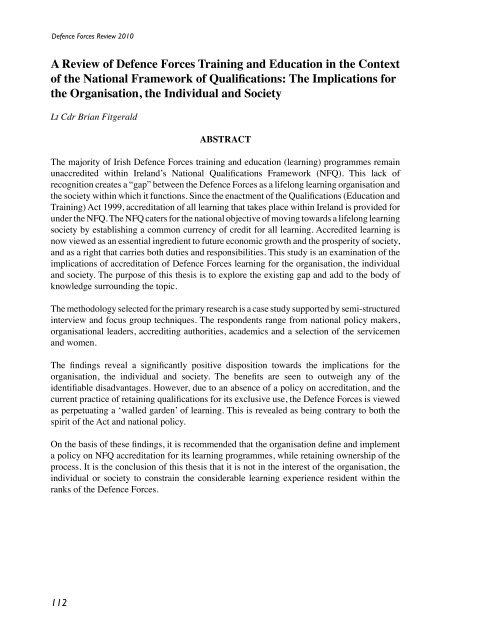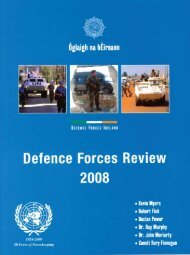Abstracts – 65 Senior Command and Staff CoursePerpetual War for Perpetual Peace. Pre-emptive Strikes:A Critical Analysis of the Effectiveness and Implications forCounter-Terrorism PoliciesComdt Rory Finegan. BA, MA, MSc.ABSTRACTThis study explores and offers a critical perspective on the claimed successes of counter-terroristpolicies, the issues that underpin them with a focus on pre-emptive actions aimed at disruptingor removing the terrorist threat. The study is comparative, by examining two detailed cases,namely, counter-terrorism activities in Northern Ireland and Israel, in order to encompassa detailed analysis of the implications of the policy of selective ‘targeted assassinations.’The literature review will be primarily based on the Israeli-Palestinian conflict. The corecase study will be the use of force against terrorists in Northern Ireland. This will allow anexploration of the dialect between the two regions and facilitate an examination of what wasoccurring contextually at the same time. What effect if any, do targeted assassinations haveon cycles of violence? Do targeted assassinations, contain, deter, and ultimately lessen ratesof violence, or increase motivations to attack with more deadly force. In a detailed analysisof both the immediate and broader implications of such activities in attempting to respond toterrorism, the strength of the arguments related to ‘lessons learned’ will be reinforced via suchanalysis. Equally this study is part of a current debate that hopefully will have an intellectualsignificance, especially given the number of politically motivated assassinations beingconducted despite the virtual absence of a sustained public and scholarly debate on the meansand the ends of targeted killing. This is the chimera that this work will attempt to grasp.Assessing the impact of targeted assassinations on insurgencies is as difficult as it is important.Theoretically, there is little agreement regarding the logical consequences of repressivemeasures in general on the strategies and tactical repertoire of insurgent groups. Hafez andHatfield (2006), identified four pillars of the Repression/Rebellion Puzzle which tests thewidest range of hypothesis, specifically, that terrorist targeting: (1) “deter militant organisationsfrom planning more attacks”; (2) “produce a backlash effect”; (3) cause a “disruption effect”that “diminishes the number and success rate of attacks,” and (4) diminishes violence whencombined with other security enablers. By assessing common themes and experiences,preliminary conclusions will be presented in light of the expected and subsequent successesor failures of pre-emptive actions. This will facilitate a critical comparison and contrastexperiences and implications from the two case studies. This study naturally lends itself toInterpretative Research, which is a sub-category of qualitative research.The analysis does not substantiate the claim that targeted assassinations had an impact on therate of PIRA attacks. Targeted assassinations do not quell violence, but they do not increaseviolence either. As a counterinsurgency tactic, their utility is questioned by these findings. Theanalysis raises doubts about the very effectiveness of targeted assassinations as a tactic in thearsenal of counterterrorism measures. On the basis of these findings it may well be that in the“War on Terror” (WOT), this tactic can be discarded without hindering the overall ability tocounter and deter terrorism.111
<strong>Defence</strong> <strong>Forces</strong> <strong>Review</strong> <strong>2010</strong>A <strong>Review</strong> of <strong>Defence</strong> <strong>Forces</strong> Training and Education in the Contextof the National Framework of Qualifications: The Implications forthe Organisation, the Individual and SocietyLt Cdr Brian FitgeraldABSTRACTThe majority of Irish <strong>Defence</strong> <strong>Forces</strong> training and education (learning) programmes remainunaccredited within Ireland’s National Qualifications Framework (NFQ). This lack ofrecognition creates a “gap” between the <strong>Defence</strong> <strong>Forces</strong> as a lifelong learning organisation andthe society within which it functions. Since the enactment of the Qualifications (Education andTraining) Act 1999, accreditation of all learning that takes place within Ireland is provided forunder the NFQ. The NFQ caters for the national objective of moving towards a lifelong learningsociety by establishing a common currency of credit for all learning. Accredited learning isnow viewed as an essential ingredient to future economic growth and the prosperity of society,and as a right that carries both duties and responsibilities. This study is an examination of theimplications of accreditation of <strong>Defence</strong> <strong>Forces</strong> learning for the organisation, the individualand society. The purpose of this thesis is to explore the existing gap and add to the body ofknowledge surrounding the topic.The methodology selected for the primary research is a case study supported by semi-structuredinterview and focus group techniques. The respondents range from national policy makers,organisational leaders, accrediting authorities, academics and a selection of the servicemenand women.The findings reveal a significantly positive disposition towards the implications for theorganisation, the individual and society. The benefits are seen to outweigh any of theidentifiable disadvantages. However, due to an absence of a policy on accreditation, and thecurrent practice of retaining qualifications for its exclusive use, the <strong>Defence</strong> <strong>Forces</strong> is viewedas perpetuating a ‘walled garden’ of learning. This is revealed as being contrary to both thespirit of the Act and national policy.On the basis of these findings, it is recommended that the organisation define and implementa policy on NFQ accreditation for its learning programmes, while retaining ownership of theprocess. It is the conclusion of this thesis that it is not in the interest of the organisation, theindividual or society to constrain the considerable learning experience resident within theranks of the <strong>Defence</strong> <strong>Forces</strong>.112
















